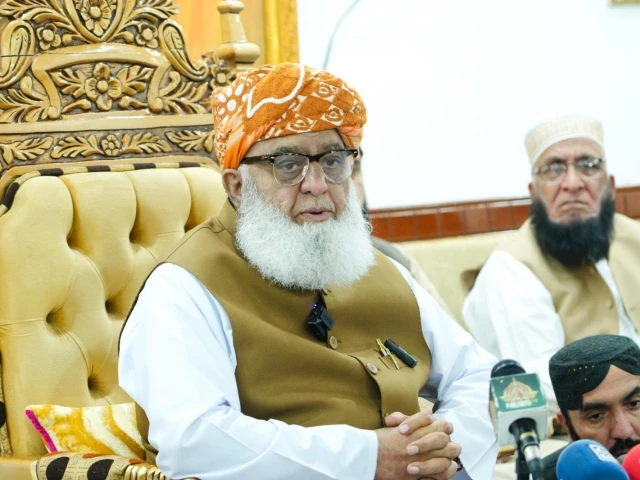JUI-F chief deems 27th Amendment 'forced and illegitimate'
Rehman criticised 27th amendment process, stating government failed to consult opposition

Jamiat Ulema-e-Islam (JUI-F) chief Maulana Fazlur Rehman has criticised the 27th constitutional amendment, describing its approval as “forced and illegitimate” and saying it did not enhance the stature of those who pushed it through.
Speaking at a press conference during a JUI-F Shura meeting on Tuesday, Maulana Fazlur Rehman said the assembly had also reviewed several laws recently passed by parliament. He said the party had completely rejected the 27th amendment and that its parliamentary members had opposed it, with the Shura endorsing their stance.
The 27th Amendment, passed in the National Assembly and the Senate by a two-thirds majority, brought about 59 changes to the Constitution. The changes include the establishment of the Federal Constitutional Court, changes to the military command structure, immunity for the President of Pakistan, and amendments to Article 199, which pertains to the transfer of judges.
He noted that during the 26th amendment, JUI-F kept Pakistan Tehreek-e-Insaf (PTI) informed of every development and had even compelled the government to accept PTI proposals. "That amendment", he added, "had undergone a process of mutual consultation and was passed in parliament with relative consensus".
Rehman criticised the 27th amendment process, stating the government failed to consult the opposition, particularly JUI-F. He described the two-thirds majority used to pass the amendment as “coerced and fake,” arguing it violated parliamentary norms and democratic principles. He added that the move had led to a rapid decline in government popularity.
Read: President signs 27th Amendment Bill into law
He also claimed that the 26th amendment had seen parliamentarians reluctantly approve measures the government had initially abandoned, creating complexities even the courts found difficult to interpret. He said JUI-F had consistently supported the constitutional court in principle.
Rehman further accused the Pakistan Peoples Party (PPP) of acting against the democratic spirit, claiming that despite holding a two-thirds majority, it consulted smaller provinces and later supported an undemocratic process.
He criticised provisions granting lifetime immunity to certain officials, questioning why former President Zardari, who had spent eight years in jail, was now shielded from prosecution.
Read more: JUI-F rejects 27th Amendment
Regarding military leadership, Rehman acknowledged the bravery of the heads of all three armed forces against India but argued that the lifetime privileges granted to them under the amendment were “unsustainable in a democratic society” and risked creating a class-based system. He suggested that the armed forces should renounce these benefits.
Rehman concluded by stressing that enacting laws contrary to the principles of equality undermines democratic norms. He asserted that the Islamic Republic of Pakistan was founded on the Quran and Sunnah, and that under the law, all individuals must be treated equally, echoing the founding principles of Muhammad Ali Jinnah.
JUI-F Khyber-Pakhtunkhwa chapter also rejected the 27th Constitutional Amendment on November 19, terming it "a conspiracy against the Islamic Constitution and contrary to national interests".
The party also announced that a provincial-level Khatm-e-Nabuwwat Conference will be held in Mardan on December 14, where JUI-F chief Maulana Fazlur Rehman will deliver a keynote address and unveil the party's future course of action.



















COMMENTS (1)
Comments are moderated and generally will be posted if they are on-topic and not abusive.
For more information, please see our Comments FAQ